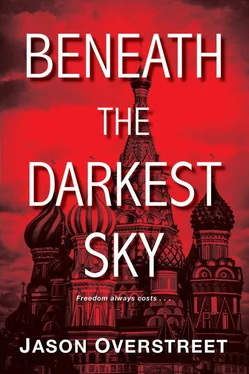“No,” I said. “He does not know that I was arrested. He must think I’ve just finished touring with my wife.”
“Touring?”
“Yes,” I lied. “Just before being arrested in Moscow, I had sent him a letter telling him that, beginning in December, we would be traveling with our children over the next six months—at least—to attend various art exhibits throughout Europe, and maybe even America, as she’d received many requests from some prominent art aficionados. Dealers! These people were offering to pay for our expenses, too.”
“Of course,” said Director Pavlov. “She sells one of her expensive paintings in their bourgeois galleries and they take a nice percentage. These capitalists always arrange to come out on the better end. Continue.”
“Apparently,” I said, “some of the important Russian artists who admired my wife’s work had spread the word about her paintings to Paris and London. The requests started flooding in. Socialist Realism was being viewed as a mysterious, fresh form apparently. All things Soviet Union are probably still viewed as mysterious and attractive to the outside world. Anyway, we were set to do a lot of European traveling beginning in December as far as Bobby was concerned.”
“I see,” said Pavlov, nodding. “Maybe this Ellington thinks you are all in Berlin now.”
The three of them looked at one another and wryly smiled.
“Maybe,” I continued lying. “I had told him that our plan was to settle down in Leningrad upon our return to the Soviet Union, a country we absolutely fell in love with. So, he might be anxiously awaiting word from me now, but he is certainly not worried. He’s a very busy man who’s probably been doing a lot of traveling himself.”
“The Kremlin would like for you to clarify one thing,” said Pavlov. “They need to confirm that he will be stationed in Germany as you’ve suggested.”
“Let’s send him a cable,” I said.
“Of course,” said Pavlov.
“This will be a long and expensive cable message,” I said.
“It’s okay,” said Pavlov. “We are paying for it.”
“It should originate from Leningrad,” I said. “It should say, ‘ Dear Bobby, I hope this message finds you, Dorene, and the children in good health. I have finally returned to Leningrad after being gone a bit longer than I’d originally anticipated .’ ”
“Stop,” said Pavlov, handing a paper and pen to the man to his left. “You must write this down in English while you continue speaking to us in Russian. Then we can cable it to the Kremlin with specific instructions.”
As the man with the pen and paper stood and walked around the table toward me, I continued writing the lie in my mind. I knew that when Bobby saw the words “finally returned to Leningrad after being gone longer than I’d originally anticipated,” he’d simply think I was referring to the lucrative engineering job at the port here at Nagaev Bay that I’d written to him about, per Koskinen’s orders.
“Write down what you’ve already shared,” said Pavlov, as the man set the paper and pen in front of me and returned to his chair. “Then begin talking again when you’re ready to add on to the message.”
“Okay,” I said, jotting it all down quickly.
“You write fast,” said Pavlov. “This is good.”
“Thank you. I’m finished and ready to continue.”
“We are ready, too.”
“Okay,” I said, my head down, as I prepared to continue writing in English while speaking in Russian. “The message should go on to say, ‘ Loretta and the children are also exhausted. All of the art exhibits and travel have been taxing on their bodies. ’ ”
I paused for a second, recalling exactly what Koskinen had ordered me to write regarding Loretta and the children while I was supposedly working at Nagaev Bay. My mind had grown cloudy over what exactly I’d written down some nine months ago. After a few more seconds, I remembered that Koskinen had said, “Tell Bobby, however, that your wife is traveling with her paintings a lot with the children.” This, of course, had been supposedly happening while I was working at Nagaev Bay.
“Sorry for the pause, Director Pavlov,” I said. “The message will then say, ‘ I wish you were here in person for me to tell you this next bit of news. It is quite sad, I must say. I’ve tried like hell to reason with Loretta over the past three weeks, but there’s no changing her mind. She has asked for a divorce. No warning whatsoever. She claims to have wanted it for years, but hadn’t known how to tell me. Her emotion toward me has gone completely cold. It’s clearly over.
“‘I guess now that her art has taken my place, she no longer loves or needs me. I also found out that she’d been secretly sending postcards to an art professor here in Leningrad from the various towns that hosted her exhibits. Perhaps she loves him. I look forward to going into more depth with you regarding this painful issue, and am actually hoping you will soon be taking that possible position at the embassy in Berlin at year’s end, as I would love to assist you. And I need the job.
“‘The best thing I can do right now is grant Loretta at least a clean separation and leave, because the children can’t bear to see us argue anymore. From Berlin, maybe I can meet them every other month in Riga. They love riding the train. Please cable me back straightaway at this telegraph office and direct it to the new Leningrad office I’ve listed above.’”
Before I continued writing, I looked up and asked Pavlov, “What is the address?”
“We’ll take care of that,” he said.
I nodded and continued talking and writing. “The conclusion of the message should say, ‘I will be stopping by the telegraph station daily until I hear from you. Your true friend, Prescott.’”
I looked up and set the pen down. The three men were staring at me with deadpan faces. Maybe they were trying to catch up to my thinking.
“You judged correctly,” said Pavlov. “You knew we would never let your family leave the prisons with you. But now this divorce explains to your comrade why they will not be joining you in Berlin. Now we just have to cable this to the Kremlin. They will study it and then forward it to the offices in Leningrad. From there it will be cabled to the embassy in Argentina, and then you must hope your comrade is indeed going to Berlin. If he is, your little plan just might get you out of here. Clear?”
“Yes.”
“But make no mistake. If you were to arrive in Berlin and decide to have your American government try to negotiate your family’s release, all of them would be killed immediately. Just a hint of any sort of inquiry by your government, even by President Roosevelt himself, about the condition of your family, would cause their deaths. Don’t ever try to get clever, Negro zek .”
“I want to say right up front,” I said, forming a lie in my mouth, “that the important intelligence I gather will be worthy of everyone’s time and consideration. I am no fan of America. It’s a country that will forever hate the Negro.”
“They love their ropes and white sheets,” said Pavlov. “What else do you have to say about the mission?”
“Well,” I said, preparing to ask two questions I already knew the answers to. “Do you know which camp my wife and daughter are being held at? And where is it located?”
Pavlov shuffled some papers in front of him, reading one. “They are being held at the MR4 Labor Camp over closer to Finland. It’s near the town of Kirovsk, which is on the Kola Peninsula.”
“Thank you,” I said.
“What else?” he said.
“I have three requests right up front,” I said. “I believe Bobby will respond within the week. And based on his wife’s relationship with President Roosevelt, I am almost certain his original wish to be stationed in Berlin by the end of 1938 will be granted. It had been all but guaranteed long ago. Argentina was just a transition posting.”
Читать дальше











